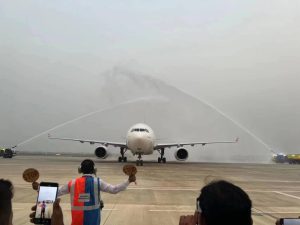Liu Jianchao, the head of the International Liaison Department of the Chinese Communist Party (CCP), completed his four-day visit to Nepal on July 13. He led a six-member delegation and called upon Nepali President Bidhya Devi Bhandari, Prime Minister Sher Bahadur Deuba, Foreign Minister Narayan Khadka, and leaders of major parties. His visit was one of a flurry of high-level visits by Chinese and U.S. delegations in recent months.
Liu’s visit came at a critical juncture in Nepali and world politics. Accordingly, his visit is significant for domestic Nepali politics, Sino-Nepal bilateral relations, and global geopolitics.
Liu’s visit to Nepal was aimed at improving China’s relations with the Nepali Congress, Nepal’s ruling party. China is not very fond of Deuba or his party, the NC. Beijing views Deuba as a pro-India and pro-U.S. leader.
NC leaders in turn believe that Beijing has favored the Communist parties. NC General Secretary Gagan Thapa alluded to the same. The last point of the seven-point summary released by Thapa upon NC’s meeting with Liu states (in Nepali) that “NC expects China to have equal relations with Nepali parties and behave as such.”
Beijing’s outreach to the NC stems from its realization that NC remains, and will remain, a formidable political force in Nepal. To assuage NC and Deuba’s concerns over China’s bias toward the Nepali communists, Liu assured them that China’s foreign policy is not dictated by ideology.
China has been concerned about the fragmentation and weakening of the Nepali communist parties. Beijing was instrumental in merging the two largest communist parties to form the Nepal Communist Party (NCP) in 2018. It tried to keep the unified party together when the NCP was on the verge of a split in late 2020. Chinese ambassador Hou Yanqi courted the party leaders actively, and Beijing sent a delegation led by Guo Yezhou, vice-minister of the International Department of the Chinese Communist Party (CCP), to prevent the split. The move did not pay off, but that level of Chinese involvement in Nepal’s domestic politics was unprecedented.
Beijing was not able to prevent the NCP’s split into three parties led by former Prime Ministers Khadga Prasad Oli (United Marxist Leninist, CPN-UML), Pushpa Kamal Dahal (Maoist Centre, CPN-MC), and Madhav Kumar Nepal (United Socialist, CPN-US).
Many analysts have pointed out that one of the goals of the Chinese delegation’s visit is to nudge the Communist forces toward a unified platform. The prospect of a “unified left” appeals to some Nepali communists. Some Communist senior leaders such as Bam Dev Gautama and Jhala Nath Khanal have been vocal about the idea. Yet no political party, whether the CPN-UML, the CPN-MC, or the CPN-US, wants to make the first move toward unification for fear of appearing desperate or inferior. It remains to be seen if Beijing will succeed in bringing them together this time around.
Moreover, China has bilateral security concerns. The visit of U.S. Under Secretary Uzra Zeya, who is special coordinator for Tibetan issues, to two Tibetan refugee camps in May has heightened Chinese security suspicions over the U.S. using Nepali territory against Chinese security. To allay Chinese concerns, every Nepali leader, upon meeting with Liu, expressed commitment to the “One China policy” and extended assurances that “Nepali territories will not be used against the interests of neighboring countries.”
Additionally, China is perturbed about the lack of progress in Belt and Road Initiative (BRI) projects in Nepal and on the agreements signed during President Xi Jinping’s historic visit to Nepal in 2019. Liu stressed the urgency of implementing those agreements. Fatigued with Nepal’s policy inconsistency, he sought cross-party uniformity in basic Nepali policies regarding China.
Finally, China is anxious about growing U.S. engagement in Nepal. Initially, it was the Millennium Challenge Corporation, a $500 million grant. China was vocal about its displeasure with Nepal’s ratification of the grant. China alleged that the U.S. engaged in “coercive diplomacy” to get Nepal’s ratification and called the grant a “Pandora’s box.” Recently, the State Partnership Program (SPP), an exchange program between the U.S. National Guard and the Nepal Army, raised Chinese eyebrows. Nepal and the U.S. signed the agreement in 2019, but it came into the public domain last month after the deal was leaked to the media. China understood the agreement to be a part of the U.S. Indo-Pacific strategy. After a national uproar, Kathmandu decided to withdraw from the agreement, a decision Beijing “commended.”
However, Nepal has not yet sent an official withdrawal letter to the United States. Beijing is apprehensive the U.S. would devise an alternate military cooperation scheme to be militarily engaged in Nepal.
Beijing wants a neutral and non-aligned Nepal. During his visit to Nepal in March, China’s State Councilor and Foreign Minister Wang Yi assured Nepal of support to find a development path suited to Nepal’s conditions and to pursue an independent domestic and foreign policy, in a dig at the United States “coercive” approach.
Liu’s visit and agenda bared the new face of Chinese engagement in Nepal: vocal and assertive. As Chinese engagement expands in Nepal, so would its tryst in national politics. In doing so, China seeks a stable political power in Kathmandu. A unified communist force could be a good alternative. At the same time, the CCP has hedged its bets by engaging the NC.
































